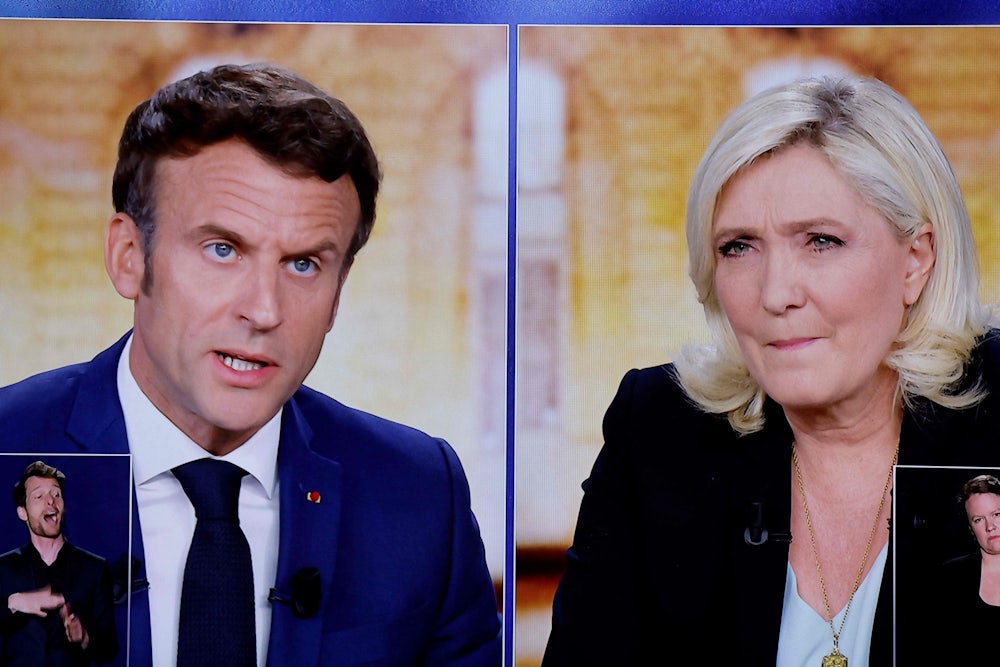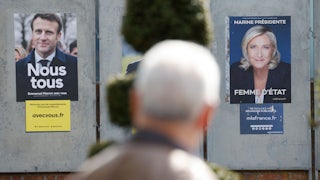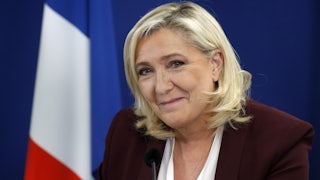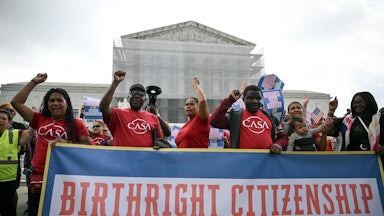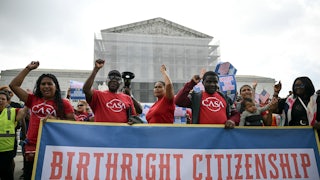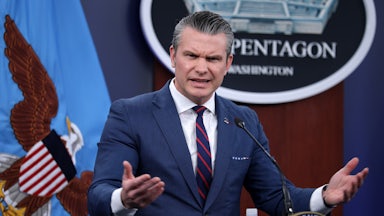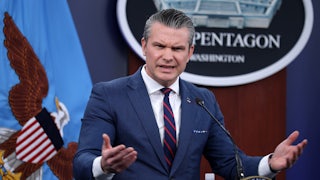On Wednesday night, French President Emmanuel Macron debated challenger Marine Le Pen for nearly three hours (25 minutes longer than scheduled) before an audience of tens of millions. Unlike in 2017, there was no knockout this year, although nearly all commentators agreed that Macron won on points. Fifty-nine percent of viewers agreed, according to one instant poll (but of course most American commentators and viewers agreed that Hillary Clinton outdebated Donald Trump). The confrontation is unlikely to have changed many votes: Even in 2017, despite Le Pen’s “bungling” of the opportunity—the word was hers—it is estimated that fewer than 3 percent of voters changed their minds.
Both candidates avoided obvious gaffes and kept their emotions under control. Macron, whose arrogance sometimes gets the better of him, frequently ignored the admonitions of the moderators and at times gave the impression of having better things to do than to listen to his opponent, but he managed to suppress his contempt and at the end even said, with a certain elegance, “While I have always combated your party and everything it represents”—a not so subtle reminder that Marine, for all her success in softening her image, remains the daughter of her still-feared father, Jean-Marie Le Pen—“I respect you personally.” And Le Pen complimented Macron on his handling of the Russian invasion of Ukraine.
As for Ukraine, Macron was the first to be called on to express a view. He may have intended to rope-a-dope by at first ignoring the vulnerability on which he might have gone straight at Le Pen: her close relationship with Vladimir Putin. Instead, he devoted his first two minutes to the suffering of the Ukrainian people and their acute needs, which he has done everything in his power to meet. She replied by expressing her own solidarity with the Ukrainians but couldn’t resist noting her disagreement on the matter of restricting gas and oil imports, which, she argued, would hit the French in their pocketbooks. Then she tried to bolster her credentials as a stateswoman by expressing her fear that any attempt to isolate Russia would force Putin to turn to Xi Jinping and risk creating a “Russian-Chinese superpower” that would threaten the West.
This gave Macron an opening to counterpunch: “You are a dependent of Russia,” he said. “You borrowed money from a Russian bank.” If Le Pen is elected president and needs to confront Putin, he concluded, “[y]ou will be speaking to your banker.” It was a palpable hit, but one that Le Pen and everyone in the audience expected, since, as she conceded, it was “a matter of public notoriety” that she had been forced to borrow from a Russian bank because no French bank would lend to her. “You yourself described this situation as undemocratic,” she countered and then tried to compare her borrowing of millions from a bank headed by a Putin crony with “a French person taking out a loan to buy a car. Just because they borrow from a French bank doesn’t make them dependent on you,” she told the French president, who laughed off the comparison. Score one for Macron.
The moderators then raised the issue of France and the European Union. Macron noted that France was indebted to the EU for the vaccines with which it staved off Covid—a slight exaggeration, since the EU coordinated the distribution of the vaccines but did not develop them. The EU also coordinated large-scale borrowing to help member states cope with the costs of the pandemic—another subject on which Le Pen got herself into a considerable muddle, but one that viewers could easily overlook.
A skirmish over the meaning of “sovereignty” followed, Macron insisting that France’s sovereignty was jointly European and national, while Le Pen accused him (incorrectly) of “replacing” the French flag with the EU flag, yet denying that she had any intention of pulling France out of the EU. Even if she had abandoned her former call for an overt “Frexit,” Macron insisted, her refusal to acknowledge the binding force of EU treaties meant that she was seeking to “shrink” the Union rather than bolster it.
On pensions there were no surprises. Le Pen stuck with her promise to reduce the legal age of retirement from the current 62 to “somewhere between 60 and 62,” while refusing to say how she would pay for it, while Macron continued to speak of raising it to 65, despite earlier indications that he might be willing to show “flexibility.”
Indeed, neither candidate seemed eager to pander in any flagrant way to voters who had supported far-left candidate Jean-Luc Mélenchon in the first round. On the environment, which Mélenchon had made one of his central themes, Macron did go after Le Pen’s incomprehensible policy of dismantling France’s extensive network of wind turbines, a position popular among rural voters who support her. Both candidates favored development of the nuclear facilities with which France generates 75 percent of its electricity, giving it an important advantage over Germany, but Le Pen attacked the president for closing an aging nuclear plant at Fessenheim, a decision he defended on technical grounds. He also pointed up the fallacy in her promotion of “green hydrogen”: Her proposal to demolish windmills would not only “cost a crazy amount of money,” he argued, but also deprive the country of electricity needed to produce green hydrogen.
This was only one of many points on which Macron’s knowledge of technical details allowed him to make his opponent seem ill-prepared to replace him. He accused her of being a “climate skeptic,” while she countered, rather weakly, that he was a “climate hypocrite”—one of several points in the debate at which she accused her adversary of hypocrisy, but which she didn’t manage to make stick (particularly on trade).
Security and immigration were the themes on which the differences between the candidates were most glaring. “I will be the president of le régalien,” Le Pen announced in her opening statement, using the term, redolent of monarchy, that the French reserve for the functions of national security and law enforcement. Gilles Bouleau, the elder of the two moderators, asked both candidates if they could “guarantee” that at the end of their five years in office there would be less violence, less crime, and less insecurity in France. Le Pen gave her unsurprising answer (yes), which Macron promptly deflated by retorting to the moderator, “Asked as you have asked it, it’s impossible to answer no to your question.” He went on to supply facts and figures about what he had already done to improve the security of the French (such as hiring 10,000 more police, increasing the budget of the courts, and beefing up protection against cyberattacks), while Le Pen insisted that the country had sunk into “barbarity and savagery” and was plagued with “anarchic and massive immigration.” She promised to rearm the police “morally,” by which she apparently meant that nothing law enforcement did to suppress “barbarity and savagery” would be subject to criticism, much less prosecution. She would ensure that sentencing was swift and certain and build more prisons to hold the expected hordes of barbarians.
This built toward the predictable clash over Islam. Le Pen wants to ban the wearing of the veil in all public places, not just schools and government offices. This, she claims, is to battle Islamism. But Macron insisted that the veil is a sign of religion, not politics, and that to ban it would be contrary to the constitution. This led to a clash over how the constitution can be amended. If you ban the veil, Macron warned, “you will foment a civil war.” Can France, the country that gave the Enlightenment its name, really be the first country to ban religious insignia in public? he mused, before asking how many police Le Pen would dispatch to remove the veils of women who chose to wear them of their own free will. Le Pen, of course, insisted that nearly all women who wear the veil are forced to do so either by threat of punishment or fear of being denounced as “impure.”
The debate was the last major event of this presidential campaign. France votes on Sunday for the second time in two weeks. Polls indicate that Macron has once again begun to increase his lead over his opponent, to roughly eight points, after it had diminished in the weeks before the first round.
Meanwhile, Mélenchon has called on his voters to “elect” him prime minister, which of course they cannot do, since the prime minister is chosen by the president, and neither Macron nor Le Pen would choose Mélenchon even in the highly unlikely event that candidates of La France Insoumise were to win a majority of seats in the National Assembly, which will be elected in June. For tactical reasons, Mélenchon is pretending that the 22 percent of the electorate who voted for him on April 10 actually want him to lead the country.* In fact, most of them cast their ballots for him because he was the only viable candidate on the left. The former mainstream parties—the Socialists and Les Républicains—were all but wiped out in the presidential vote but retain power bases around the country and will achieve more respectable scores in the legislative election.
If Macron is reelected, he may need to compromise with these parties on the details of his program. If Le Pen wins, she will certainly not have anything close to a parliamentary majority and has a relatively thin bench of experienced officials from which to form a government. In addition, she will probably have to contend with violent protests, a falling stock market, rising bond spreads, and expressions of dismay from many of France’s allies. She would therefore probably move cautiously at first, refraining from enacting her more radical proposals while seeking support from friends such as Viktor Orbán in Hungary and Matteo Salvini in Italy. The presence of the far right in or near power in other European capitals makes a Le Pen victory less unthinkable that it would once have been, but the realization of the Le Pen family’s long-standing dream of conquering the Elysée would nevertheless shake Europe to its core in this very dangerous moment of war in Ukraine. The revival of “the Western alliance” in the face of the Russian threat would abruptly end.
The world could look very different at 8 p.m. this Sunday when the results are announced. For a brief moment France will once again hold the attention of the entire world, not because it will have regained the grandeur of which General de Gaulle once dreamed but because it will have avoided sinking into bassesse—or not.
* This article originally misstated the date of the first round of the French elections.
